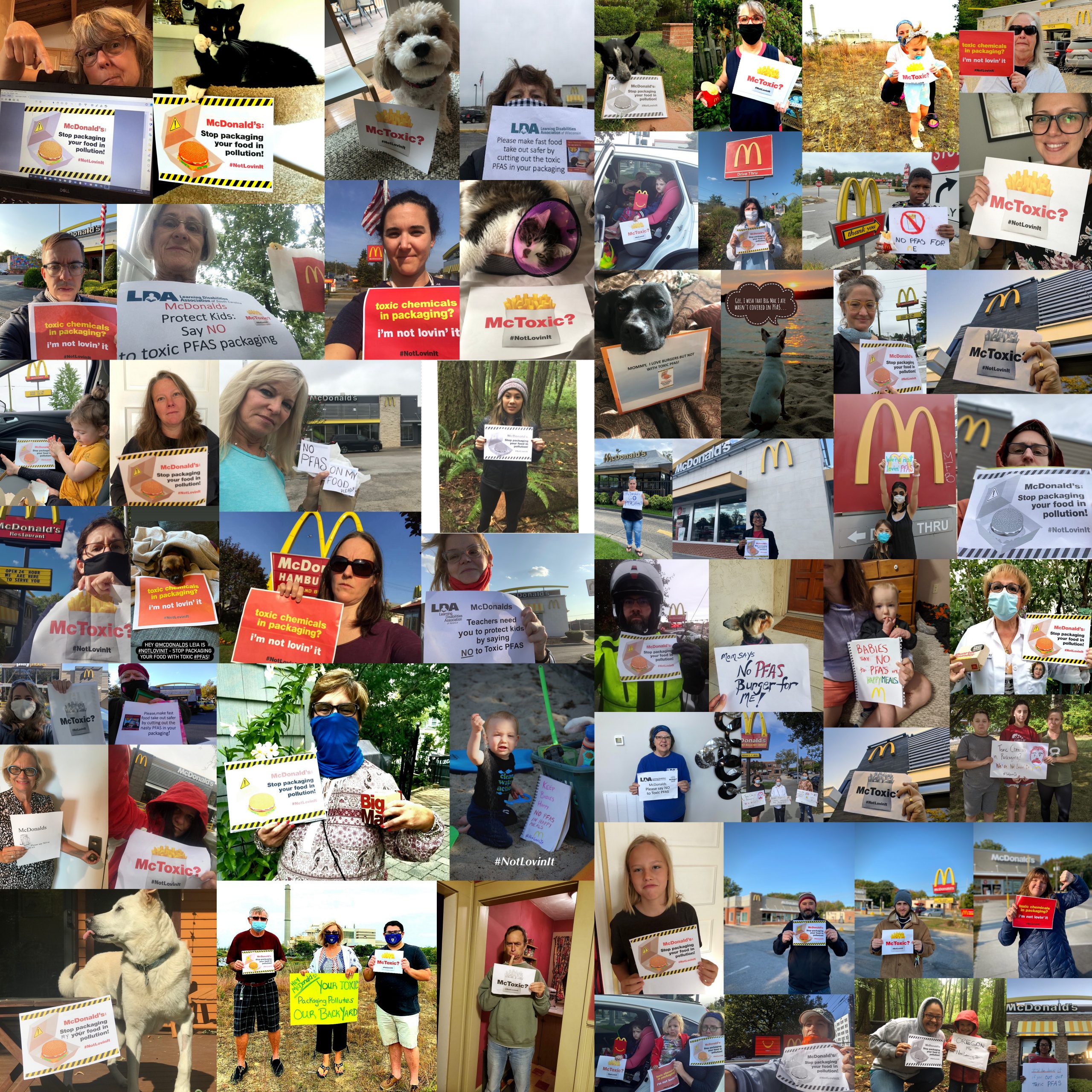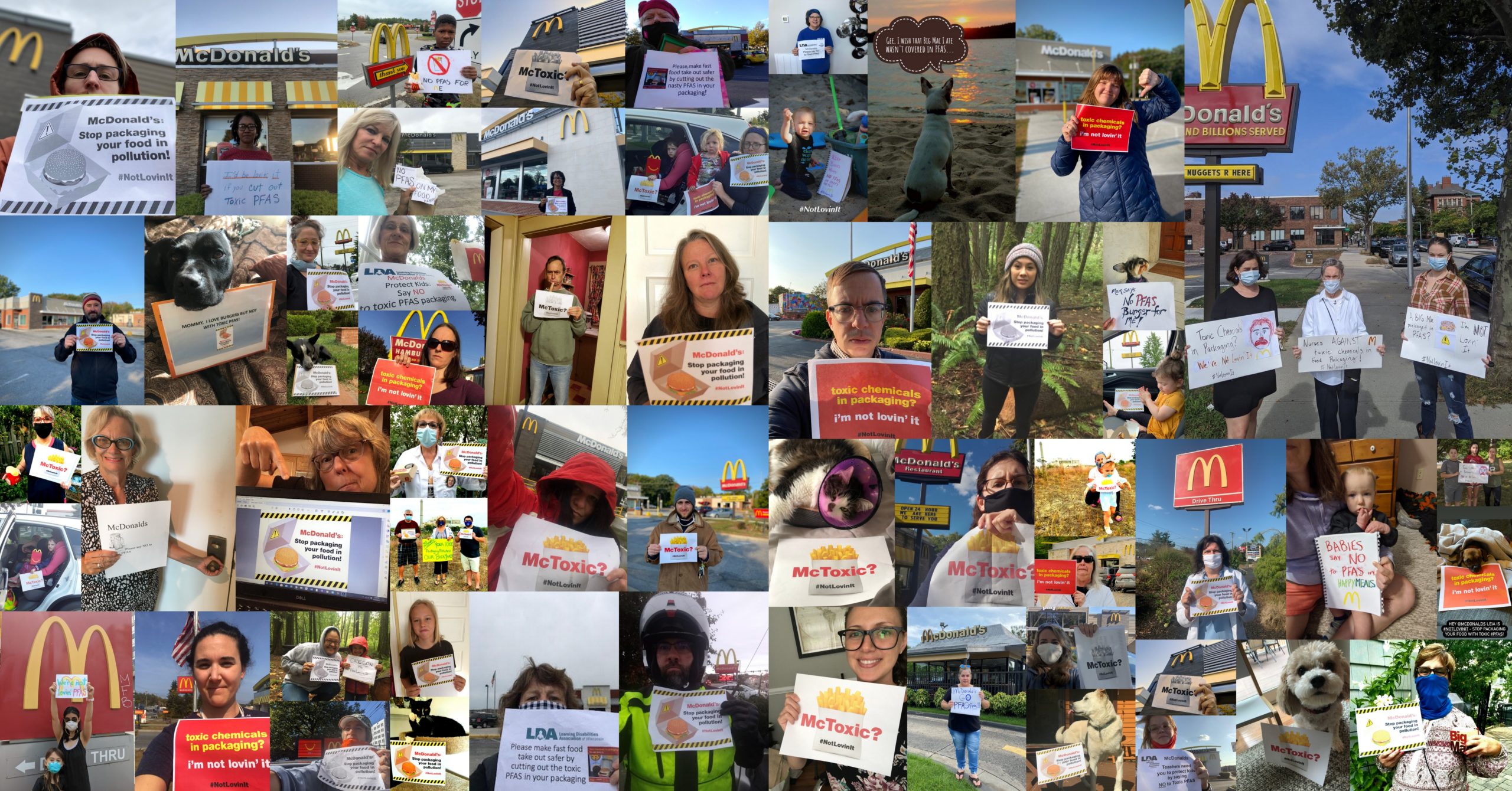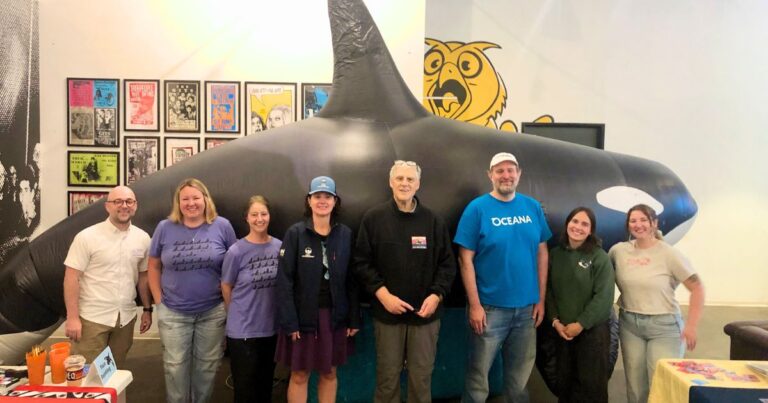Over a million Big Mac boxes are used and discarded each day. And our recent test results show that those boxes may be contributing to the PFAS “forever chemicals” pollution crisis.
Corporations add PFAS forever chemicals to food packaging to make it grease-resistant. The packaging is used once, but toxic PFAS chemicals last forever in the environment. That’s why we’re calling on McDonald’s to stop packaging their food in pollution.
Pressure mounting on McDonald’s CEO to ban forever chemicals in food packaging
Since the test results were released in August, over 70,000 people across the country have taken action and signed petitions calling on McDonald’s CEO Chris Kempczinski to ditch this poisonous packaging. The Change.org petition also puts a spotlight on the damage these chemicals have caused in communities like Decatur, Alabama where PFAS is made for food packaging.
Just last week, the Learning Disabilities Association of America, the ARC, and learning and developmental disabilities organizations in more than twenty states sent McDonald’s a letter calling on the company to do the right thing, for the health and welfare of young children and future generations.
In light of the company’s failure to lead, advocates have also started visiting McDonald’s stores around the country, telling the company: “We’re not lovin’ it!” Last month, advocates and parents from Alaska to Illinois to Maine visited dozens of McDonald’s locations nationwide. Check out our collage of photos highlighting these consumers raising their voices for action:

Would you like a side of PFAS with that?
You should be able to get a quick meal and be confident that you aren’t getting a side of toxic chemicals. But our recent testing of paper packaging from top fast-food chains—McDonald’s, Burger King, and Wendy’s—as well as top health-minded chains—Sweetgreen, Cava, and Freshii—found fluorine levels suggesting PFAS treatment in nearly half of the samples.
When people eat food from this packaging, they may end up ingesting some of the chemicals too.
In our recent study with Toxic-Free Future, the Big Mac box tested positive as did a McDonald’s fry bag and cookie bag. And if all this McDonald’s packaging used across the country has PFAS, the company could be responsible for a whole lot of forever chemicals going into landfills and incinerators each day.
We’re not lovin’ it!
The study has been widely covered in mainstream media, from CNN to Fox News to Consumer Reports. Even Jimmy Fallon highlighted it on the Tonight Show.
Altogether, the report was mentioned in the news more than 540 times and received significant national visibility, potentially reaching an audience of more than 780 million people. That’s a lot of potential McDonald’s customers.
PFAS: Toxic from production to use and disposal
Here’s why so many people are stepping up to call on McDonald’s to get these forever chemicals out of packaging.
When PFAS chemicals are manufactured for packaging, they can contaminate the communities surrounding the chemical plants and paper mills where they’re made and processed. The chemicals can migrate from the PFAS-containing food packaging into our food and make their way into our bodies. And once PFAS-containing toxic trash goes into a landfill or incinerator, the chemicals can end up in our air and water. Talk about a toxic lifecycle.
Due to their widespread use, PFAS chemicals are showing up in drinking water across the country and in most Americans’ bodies. They have been linked to increased risk for certain cancers, immune system suppression, and reduced birth weight. They can even make us more vulnerable to infectious diseases like COVID-19.
But for decades, giant chemical corporations have been making them for use in food packaging—for their grease and water resistance.
Other retailers act, while McDonald’s lags behind
Many other leading quick-service restaurant chains are taking action. Sweetgreen, whose bowls tested positive in our study, announced it is phasing out packaging with PFAS by the end of 2020. Cava and Freshii followed suit. And over the last year, Chipotle, Taco Bell, and Panera Bread have announced action on PFAS too. But so far, McDonald’s has failed to join this growing sustainability trend.
Alternatives are readily available. And some cities and states have started to ban PFAS packaging.
Just like McDonald’s once stopped using polystyrene foam (commonly known as “styrofoam”) for packaging, it must stop using these toxic forever chemicals.
McDonald’s is the biggest fast-food chain in the world. They have the power to drive toxic PFAS out of fast-food packaging. If McDonald’s stops putting PFAS in its food packaging, it will affect the whole industry. That’s a sustainability commitment its customers would surely love.





